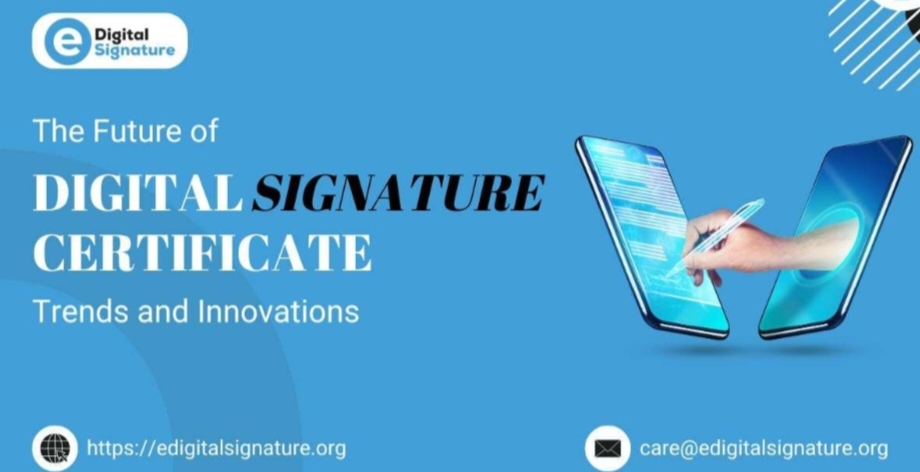Digital Signature Certificates (DSCs) have become a cornerstone in the realm of digital transactions, ensuring the authenticity and integrity of electronic documents. As we move further into the digital age, DSCs are poised to undergo significant transformations, driven by technological advancements and evolving security needs. This piece explores the emerging trends and innovations that are shaping the future of digital signature certificates, highlighting their potential impact on businesses and individuals alike.
Trends
Quantum-Resistant Cryptography:
As quantum computing advances, traditional cryptographic methods face the risk of becoming obsolete. Quantum-resistant algorithms are being developed to ensure that DSCs remain secure in a post-quantum world. These algorithms aim to protect digital signatures from being easily decrypted by quantum computers, ensuring long-term security.
Blockchain Integration:
Blockchain technology offers a decentralized and tamper-proof way to manage digital signatures. By integrating DSCs with blockchain, the authenticity and timestamping of documents can be enhanced, reducing fraud and providing a clear audit trail. This synergy also supports the creation of smart contracts that execute automatically when certain conditions are met, further streamlining digital transactions.
Biometric Authentication:
Incorporating biometric data such as fingerprints, facial recognition, or iris scans into digital signature processes adds an extra layer of security. This multi-factor authentication ensures that the person signing the document is indeed who they claim to be, reducing the risk of identity theft and unauthorized access.
AI and Machine Learning:
Artificial Intelligence (AI) and Machine Learning (ML) are being harnessed to detect anomalies and potential fraud in digital signatures. These technologies can analyze patterns and flag suspicious activities in real time, enhancing the security and reliability of DSCs.
Regulatory Harmonization:
With the globalization of digital business, there is a growing need for standardized regulations governing the use of DSCs across different jurisdictions. Efforts are underway to harmonize these regulations, making it easier for businesses to operate internationally and ensuring that digital signatures are recognized and trusted worldwide.
User-Friendly Interfaces:
The future of DSCs lies in their accessibility and ease of use. Simplified user interfaces and seamless integration with commonly used software and platforms are making digital signatures more accessible to a broader audience, including small businesses and individual users.
Innovations
Cloud-Based DSC Solutions:
Cloud technology is revolutionizing the way digital signatures are issued and managed. Cloud-based DSC solutions offer scalability, ease of access, and cost-effectiveness, allowing users to sign documents from anywhere, at any time, without the need for specialized hardware.
IoT Integration:
The Internet of Things (IoT) is expanding the scope of digital signatures to a myriad of devices. From smart contracts in supply chains to secure communications between IoT devices, DSCs are becoming integral to the functioning of interconnected systems, ensuring secure and verifiable interactions.
Zero-Knowledge Proofs:
Zero-knowledge proof protocols allow one party to prove to another that they know a value (e.g., a private key) without revealing any information about the value itself. This innovation enhances privacy and security in digital signature processes, particularly in sensitive transactions where confidentiality is paramount.
Cross-Platform Compatibility:
Ensuring that DSCs work seamlessly across various devices and operating systems is crucial for their widespread adoption. Innovations in cross-platform compatibility are enabling users to sign documents effortlessly, regardless of the device or software they are using.
Automated Workflow Integration:
The integration of DSCs into automated workflows streamlines business processes, reducing the need for manual intervention. This innovation is particularly beneficial in industries such as finance, legal, and healthcare, where efficiency and accuracy are paramount.
Also, read Digital Signature Certificate for EPFO
Conclusion
The future of Digital Signature Certificates is bright, with numerous trends and innovations set to enhance their security, usability, and functionality. From quantum-resistant cryptography and blockchain integration to AI-driven fraud detection and biometric authentication, DSCs are evolving to meet the demands of a rapidly changing digital landscape. As regulatory frameworks become more harmonized and technologies such as cloud computing and IoT continue to develop, DSCs will play an increasingly vital role in securing digital transactions across the globe. Embracing these advancements will not only improve the trust and efficiency of electronic communications but also pave the way for new opportunities in the digital economy.



